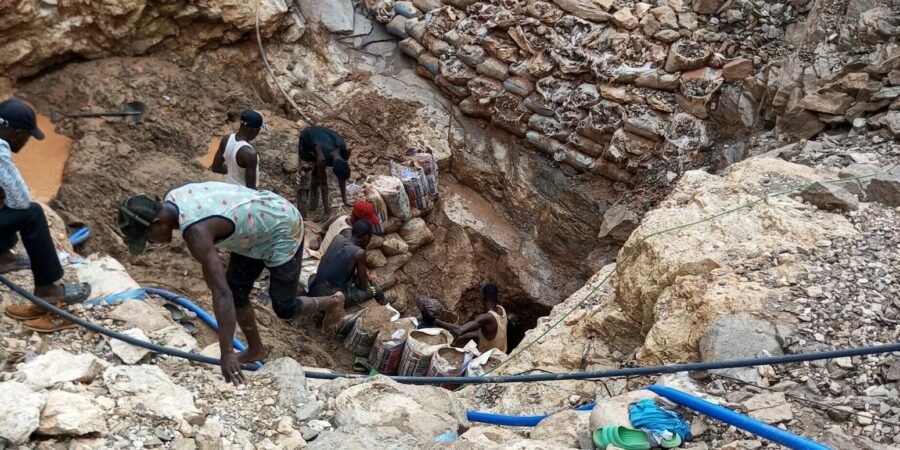Nigeria is blessed with an abundance of mineral resources. From columbite, tantalite, lithium, beryllium, monazite, iron ore, limestone, feldspar, fluorite, bitumen, coal, and gemstones, to cassiterite! The list is endless and the potential for a thriving mining industry is undeniable. However, a significant portion of this sector operates informally, hindering its growth and contribution to the national economy.
The recent government policy to formalize artisanal miners is a welcome step towards unlocking Nigeria’s mineral wealth. In fact, the formalization of artisanal miners is the beginning of the development of this all-important sector because, in the development of the productive forces of any sector, the starting point is the development of the labor power- man the worker, man the laborer. This entails developing his skills, his talents, his intellect, all his physical and psychological abilities and capabilities.
Formalizing the artisanal miners is the beginning of their development. They must be brought under the ambit of the law so they can operate formally. But that is one leg of the formalization process. The second leg is that they must be trained and given modern tools to enhance and optimize their operations. Digger, chisel, and hammer kind of mining, powered by guesswork are on their way to the graveyard! We must upgrade the skills and tools these patriotic folks use in their work. This policy is likely to be the most important and game-changing policy of the Tinubu Administration if implemented effectively. It has the potential to significantly boost the economy in several ways:
- Increased Revenue: Formalization brings artisanal miners into the tax net, generating much-needed revenue for the government. This revenue can be used to fund infrastructure development, social programs, and further investment in the mining and other sectors.
- Job Creation: A formalized mining industry fosters the creation of new jobs, not just for miners themselves, but also for professionals in geology, engineering, logistics, and administration. This can lead to a significant reduction in unemployment and a boost to the overall economy.
- Sustainable Practices: The environmental footprint in the Nigerian mining industry is much. Formalization allows for the implementation of regulations and best practices for mining. This can ensure environmental sustainability, minimize health risks for miners, and promote responsible sourcing of minerals.
- Attracting Investment: A formalized mining sector becomes more attractive to local and international investors. This can lead to increased investment in exploration, equipment, and infrastructure, further propelling the industry’s growth.
- Improved Efficiency: Formalization paves the way for the adoption of modern mining techniques and technologies. This can lead to increased efficiency, higher productivity, and waste reduction.
- Reduction in Insecurity: Informal mining can be associated with criminal activity and violence. Formalization can bring these activities under legal control, open access to data, and improve security and monitoring in mining regions.
- Industrialization: A formalized mining sector can lay the foundation for downstream industries that process and refine minerals, leading to further economic diversification and job creation.
- Strengthening the National Currency: Increased exports of ethically sourced minerals can generate foreign currency, strengthening the Naira and improving Nigeria’s position in the global market.
- Activating Diversification: Formalized mining lessens reliance on oil as the main source of revenue, promoting a more diversified and resilient economy.
- Development of Allied Services Sectors: The growth of the mining industry creates demand for a range of supporting services like transportation, logistics, and financial services, stimulating these sectors and creating additional jobs.
- Development of Rural Economy: Formal mining often takes place in rural areas. Formalization can bring investment and economic activity to these regions, improving infrastructure and livelihoods.
- Women Empowerment: Formalization can create opportunities for women to participate in the mining sector, both in mining itself and in allied services, promoting gender equality and economic empowerment.
- Increase in GDP: The combined effects of increased revenue generation, job creation, and industrialization will lead to a measurable increase in Nigeria’s Gross Domestic Product (GDP).
Formalizing artisanal miners is not without its challenges. There’s a need for capacity building to equip miners with the necessary skills and knowledge to operate formally. Additionally, access to financing and infrastructure development are crucial aspects that need to be addressed.
However, the potential benefits of a formalized artisanal mining sector far outweigh the challenges. By working together, the government, miners, and stakeholders can transform this sector into a major driver of economic growth and prosperity for Nigeria.
This is just the first step towards a brighter future for Nigeria’s mining industry. Stay tuned for further insights on how this policy can be implemented effectively to maximize its positive impact.
READ Also:
Need a Mining License or Mineral Trade Permit in Nigeria? Here’s How We Can Help




